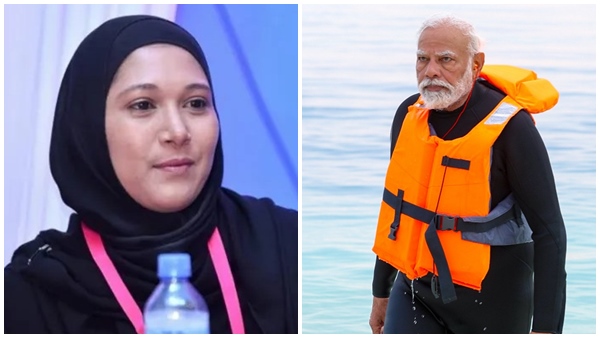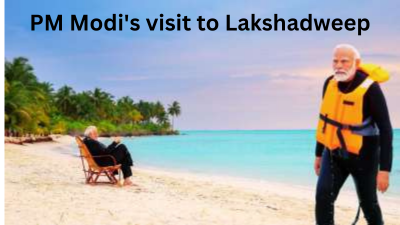After Prime Minister Narendra Modi's recent visit to the territory, Lakshadweep—known for its stunning beaches and fascinating coral reefs—has gained prominence on the international map. The stunning islands, renowned for their unmatched natural beauty, are seeing an extraordinary increase in global search interest, reaching a surprising peak not witnessed in the previous 20 years. It's amazing to see how Prime Minister Narendra Modi's brief visit to Lakshadweep, a lonely sanctuary, shot to international prominence in just a few hours. People all over the world are intrigued and in awe of this tropical paradise due to the attractiveness of the islands, which was further enhanced by the visit of the Prime Minister of India. The increase in interest from around the world highlights the influence that leaders have on how people perceive a location and provides Lakshadweep with more chances to show off its distinct beauty to a wider range of people.
What was Maldives' reaction to Indian Prime Minister's visit to Lakshadweep?
Social media was rocked by the Prime Minister's decision to share glimpses of his snorkeling adventure and peaceful moments on the gorgeous beaches. The shocking disclosure that the leader enjoyed leisure activities revealed a more vulnerable and approachable side of himself, which struck a chord with a large number of people. In addition to offering a peek into the Prime Minister's personal life, the photos and stories went viral online and generated a lively and constructive conversation. This informal revelation let citizens establish a human connection with their leader in a world where official tasks and serious problems often take center stage, resulting in a sense of camaraderie and shared experiences.
Some Maldivian ministers took to criticizing Prime Minister Modi and India during his recent visit to Lakshadweep, even going so far as to make disparaging remarks. Unexpectedly, three Maldivian politicians charged that Prime Minister Modi was deliberately pushing Lakshadweep as a rival tourism destination, ostensibly to compete with the Maldives.
Many Indians expressed their disapproval on social media in response to this unexpected remark, which caused a furore. In addition to hurting many people's feelings, the remarks also had the regrettable effect of making some decide not to go on their already scheduled trips to the Maldives. The episode acts as a reminder of the influence that political and diplomatic developments can have on tourism and people-to-people connections, influencing not only formal links but also the opinions and decisions of citizens on both sides.
In another unfortunate incident, Malsha Sharif, a deputy colleague of Shiuna in the Ministry of Youth Empowerment, Information, and Arts in the Maldives, has echoed derogatory comments against the tourism campaign in India and Lakshadweep. The comments, which seem to lack accuracy and understanding, reflect a concerning trend within the ministry.
Malsha Sharif's disparaging remarks, akin to those made by Shiuna, undermine the collaborative spirit that should ideally exist between nations, especially in matters as crucial as promoting tourism. The tourism campaign in India and Lakshadweep is an earnest effort to showcase the natural beauty and cultural richness of the region, aiming to attract visitors and boost economic growth.
It is disheartening to note that a member of the ruling Progressive Party in the Maldives has also contributed to the misinformation, sharing an image believed to be of the Bora Bora islands in French Polynesia and misleadingly claiming it to be an island resort in the Maldives. Such misleading statements not only perpetuate inaccuracies but also hinder the potential for positive collaborations between nations.
The reference to a supposed lack of stunning sunsets in Lakshadweep, accompanied by an invitation to travel to the Maldives, adds a divisive tone to the discourse. It is essential for public figures, especially those in governmental positions, to exercise caution and responsibility when expressing opinions, particularly on international platforms. Cooperation and mutual respect are key pillars in fostering healthy diplomatic relations, and remarks that fuel discord do little to serve the interests of either nation.
As the diplomatic community navigates the complexities of international relations, it is crucial to encourage constructive dialogue and bridge gaps in understanding. Perhaps, a more informed and nuanced approach to discussing matters related to tourism and culture would contribute to the harmony that should ideally define relations between neighboring countries. It is hoped that such incidents prompt introspection and a commitment to promoting accurate information, fostering goodwill, and strengthening diplomatic ties.

What allegation has Maldivian social media made on India and PM's visit?
While India's effort to position itself as a tropical tourist destination has garnered attention, criticism has emerged on social media, with some individuals expressing skepticism about its ability to compete with established destinations like the Maldives. Senator Zahid Rameez of the Progressive Party of the Maldives commended the initiative but questioned India's capacity to deliver a comparable level of service and maintain cleanliness, pointing out concerns about potential issues like room odors. Unfortunately, the discourse on social media took an unfortunate turn, with some users resorting to racist comments targeting Indians and Indian visitors to the Maldives, highlighting the need for respectful and constructive conversations about global tourism initiatives.
Year after year, Indian tourists continue to hold a prominent position among the top visitors to the picturesque Maldives, as affirmed by official data from the Maldives government. In 2023, the island nation played host to a staggering 200,000 Indian tourists, solidifying their status as the largest group of visitors. Notably, this influx surpassed the numbers from other nations, with China and Russia trailing behind. This tourism trend underscores the enduring appeal of the Maldives as a favored destination for Indian travelers.
The significance of Indian tourism to the Maldives cannot be overstated, considering the vital role tourism plays in the nation's economic landscape. The sector contributes substantially, accounting for over 28% of the Maldives' Gross Domestic Product (GDP), as highlighted by a study from Michigan State University. This dependence on tourism as a key economic driver emphasizes the importance of sustaining and enhancing the appeal of the Maldives to international visitors.
The Indian preference for the Maldives as a travel destination speaks not only to the geographical proximity but also to the unique allure of the islands. The azure waters, pristine beaches, and vibrant marine life contribute to the Maldives' status as a tropical paradise. The popularity among Indian tourists reflects not just a travel choice but a testament to the Maldives' ability to cater to diverse preferences and offer an unforgettable experience.
As the Maldives continues to welcome visitors, the tourism sector's resilience and adaptability become increasingly critical. Nurturing this relationship with Indian tourists and addressing their evolving expectations will undoubtedly contribute to the sustained growth of the Maldives' tourism industry. Moreover, with the economic significance of tourism, the island nation is likely to explore innovative strategies to maintain its status as a preferred destination for global travelers, with a special emphasis on the vibrant Indian market.









